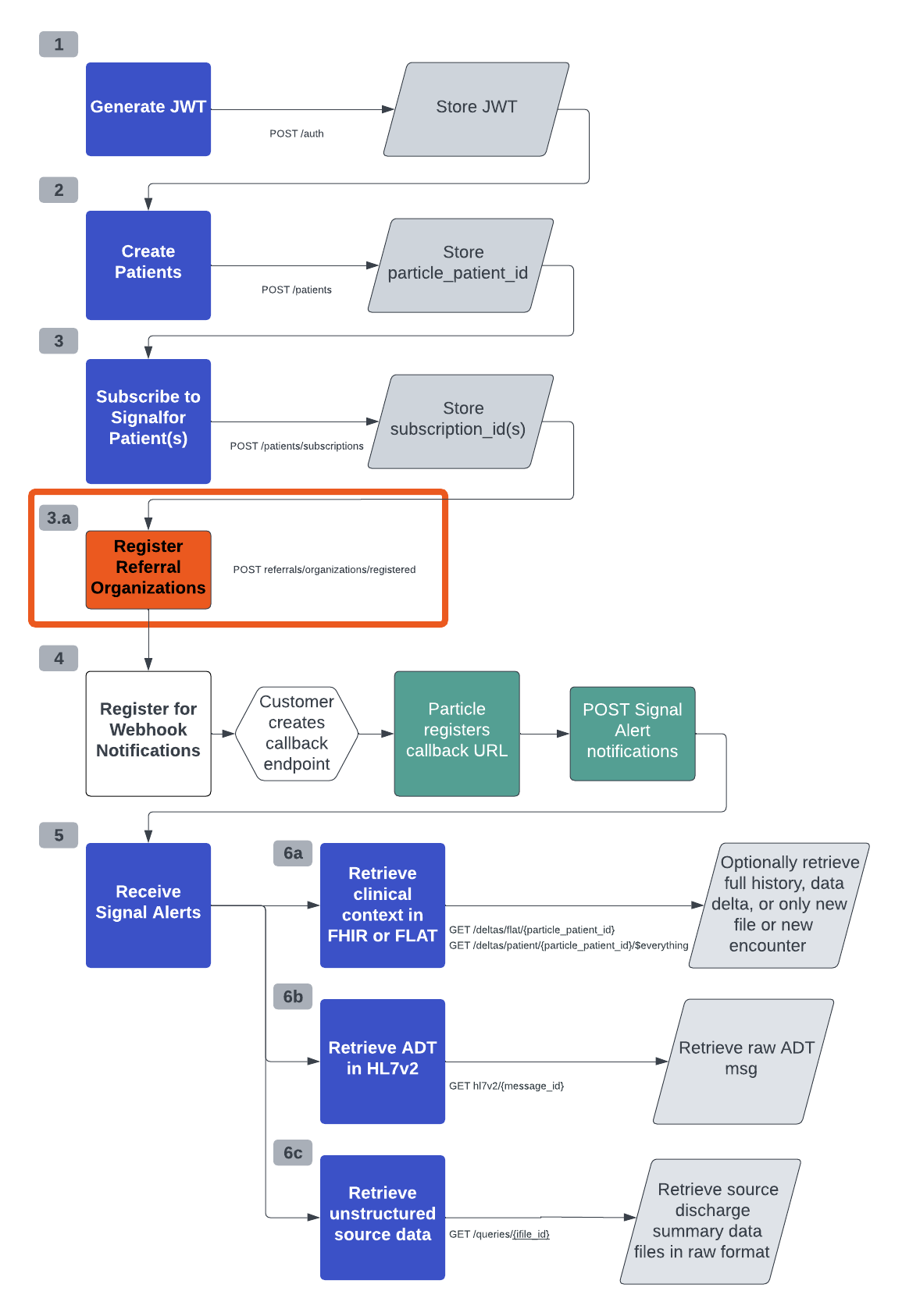Referral Management
Monitor your patients for referrals & specialist visits
Background
Particle offers Referral Management as part of our Signal Solution. This product enables our customers to enroll a patient (or a cohort of patients) that they have referred to another provider outside of their own provider group or network. Once the customer shares the information about the referral, Particle Health will then start monitoring the health information networks to see when new data has come in from that organization for that patient. Your team will receive a Referral Alert that data is ready to be pulled down and you will be passed any net new data that was generated by that encounter. You will also be able to know when a patient did not follow up on a referral so you can take action.
This ultimately can result in providing better care, and is especially important in value-based care arrangements.
Configuring Referral Management
To set up Referral Management for a single patient or a cohort of patients, you can follow the configuration steps outlined in Particle Signal to generate authentication, create your patients, and enroll them in Signal. Per that process, you can have Particle automatically enable Signal for all patients for your organization or you can opt to leverage the Subscriptions API to enroll a single patient or cohort of patients to monitor for referrals (i.e., to Referral Alerts).
There is one additional step you will need to take for Referral Management, which is to register the "Referral Organizations" that you want Particle to monitor for referrals for your patients.

Register Referral Organizations
The Referral Organizations API enables you to register the list of organizations to which you typically refer your patients (_i.e.), your "Referral Organizations"). You will need to register Referral Organizations that you want to Particle to monitor for patient referrals in order to receive Referral Alerts.
You can retrieve the list of ReferralOrganizations that Particle supports by calling our Referral Organizations API:
GET /referrals/organizations
This will return the list of all organizations - including the name, address, and the OID for each organization - that you can register for Particle to monitor for your patients. You can then register any Referral Organizations on this list by passing the organization oid (i.e., unique identifier) in a request to the Referral Organizations API. See example below:
Example Request - Register Referral Organizations
| Description: | Register organizations you want to monitor for referrals |
|---|---|
| Path: | api.particlehealth.com/api/v1/referrals/organizations/registered |
| Method: | POST |
Example Request Body
{
"organizations": [
{
"oid": "2.16.840.1.113883.3.8391.5.710576"
}
]
}In addition to registering your ReferralOrganizations, this API allows you to retrieve a list of all registered Referral Organizations that you are tracking for Referral Alerts cross your entire patient population, as well as delete any Referral Organizations. Check out the Referral Organizations API Reference for more details.
*The list of supported Referral Organizations includes all organizations available on CommonWell, eHealth Exchange, Carequality, and Healthix (if you have access to Healthix). As some organizations are not connected to the networks, they may not be available for Signal and will not be included on this list.
Receive Referral Alerts & Retrieve Data
Particle continuously monitors the networks for new encounters. When Particle retrieves clinical context from a specialist encounter at an organization that you have asked us to monitor for patient referrals, Particle will update the referral status to COMPLETE and send a Referral Alert to the endpoint that you have set up to receive Signal Alerts.
Referral Alert Payload
{
"specversion": "1.0",
"type": "com.particlehealth.api.v2.referralalert",
"subject": "Referral Complete",
"source": "api/notifications",
"id": "ea77d12d-bb97-438e-82eb-1b0d10a7e3ee",
"time": "2024-07-22T10:10:10Z",
"datacontenttype": "application/json",
"data": {
"network_organization": {
"name": "Rochester Hospital",
"oid": "2.16.840.1.113883.3.8391.5.710576"
},
"particle_patient_id": "d939196d-0c80-4e82-b0e1-19f9ee271085",
"network_alert_ids": [
"1cac1ea7-f3a9-43b3-bca3-04d3ec4362c5",
],
"adt_message_ids": [
"6e7303bd-2c1a-49f2-add0-820babbdb95a",
],
"referral_id": "a17846c4-4270-427b-b191-bd5e76cf8f30",
"referral_status": "COMPLETE",
"resources": [
{
"file_id": "d6a96f73-eb18-4faa-b021-143e7777fe8b",
"resource_ids": [
"Encounter/b10fe2ef-47f9-4507-97c8-1a8c2215478e"
]
}
]
}
}Note that the Referral Alerts follow the same same schema and surface the same data elements as the New Encounter Alerts. However, these alerts are specifically intended to enable customers to track encounters that occur at the specific organizations to which they've referred patients - i.e., to enable customers to track referrals and the resulting specialist visits. Particle also tracks the "status" of referrals, to enable customers to monitor referrals that are COMPLETE vs. INCOMPLETE. See Checking Referral Status.
Retrieve Referral Data
Particle provides customers with the flexibility to specify how much clinical context they want to retrieve for a given Referral Alert (e.g., full history, data delta, new file, or new encounter only). See Retrieving Clinical Context for more details.
Check Referral Status
While Particle will notify you via a Referral Alert if there are any update(s) for the patients you have asked us to monitor referrals, you also have the option to proactively check on the status of any patient referrals that you have asked Particle to monitor, via the List Patient Referrals API.
You can GET the status of all referrals for a given patient, referral organization, or referral state, by passing the particle_patient_ids, oid, or referral_states respectively.
The response will return the particle_patient_ids, oid, and referral_states, and the timestamp at which the referral_state was last updated. If you do not pass any parameters, the response will include this information for all patient referrals that you have configured.
| Description: | Retrieve the status of any referral(s) that you are monitoring |
|---|---|
| Path: | api.particlehealth.com/api/v1/referrals |
| Method: | GET |
Example Response
{
"referrals": [
{
"particle_patient_id": "d939196d-0c80-4e82-b0e1-19f9ee271085",
"referred_to_oid": "test-referral-oid-1",
"state": "INCOMPLETE",
"updated": "2024-06-18T18:49:02Z"
},
{
"particle_patient_id": "d939196d-0c80-4e82-b0e1-19f9ee271085",
"referred_to_oid": "test-referral-oid-2",
"state": "INCOMPLETE",
"updated": "2024-06-24T17:13:22Z"
},
{
"particle_patient_id": "d939196d-0c80-4e82-b0e1-19f9ee271085",
"referred_to_oid": "test-referral-oid-4",
"state": "INCOMPLETE",
"updated": "2024-06-24T17:20:00Z"
},
{
"particle_patient_id": "d939196d-0c80-4e82-b0e1-19f9ee271085",
"referred_to_oid": "test-referral-oid-5",
"state": "INCOMPLETE",
"updated": "2024-06-24T19:51:51Z"
},
{
"particle_patient_id": "d939196d-0c80-4e82-b0e1-19f9ee271085",
"referred_to_oid": "test-referral-oid-6",
"state": "INCOMPLETE",
"updated": "2024-06-24T19:52:23Z"
},
{
"particle_patient_id": "d939196d-0c80-4e82-b0e1-19f9ee271085",
"referred_to_oid": "test-referral-oid-7",
"state": "INCOMPLETE",
"updated": "2024-06-24T19:53:37Z"
}
]
}Updated 13 days ago
